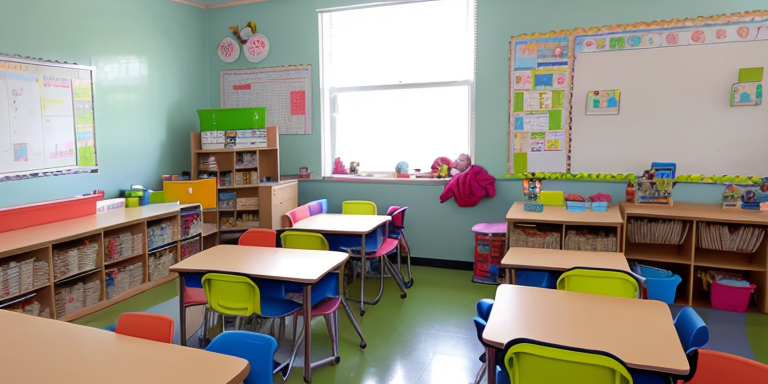The Importance of Early Childhood Education
Early childhood education is a critical period for a child’s development. It is during this time that a child’s brain is rapidly developing, and the foundation for future learning and success is established. Research has shown that children who receive high-quality early childhood education are more likely to succeed academically, socially, and economically in the long term.
The benefits of early childhood education are numerous. Children who attend high-quality early childhood education programs are more likely to enter school ready to learn, have higher academic achievement throughout their school years, and are more likely to graduate from high school and attend college. They also demonstrate better social and emotional skills, including self-regulation, empathy, and problem-solving.
In addition to the long-term benefits for children, early childhood education also has a positive impact on families and communities. Parents who have access to high-quality early childhood education programs are more likely to be employed and have higher earnings. Communities benefit from a more educated and productive workforce, lower crime rates, and reduced reliance on social services.
This article will explore the importance of early childhood education in-depth, including recent research and studies, successful programs, and tips and advice for parents and caregivers. We will also discuss the role of early childhood educators and the challenges they face in providing high-quality education to young children.
By investing in early childhood education, we can set our children on a path to success and create a brighter future for our communities. Let’s explore the benefits of early childhood education and how we can support our children’s development.
The Long-Term Benefits of Early Childhood Education
Early childhood education has a significant impact on a child’s academic and social development. Recent studies have shown that children who participate in high-quality early childhood education programs are more likely to succeed academically, have higher earnings as adults, and are less likely to engage in criminal activity. These benefits extend beyond the individual and positively impact society as a whole.
One successful early childhood education program is the Perry Preschool Project, which provided high-quality education and support to low-income African American children in the 1960s. The program resulted in higher graduation rates, increased earnings, and reduced criminal activity among participants. This program demonstrates the long-term benefits of investing in early childhood education.
Early childhood education also has a significant impact on a child’s social development. Children who participate in early childhood education programs are more likely to develop positive relationships with peers and adults, have better communication skills, and exhibit fewer behavioral problems. These skills are essential for success in school and later in life.
Uvanni is an example of a successful early childhood educator who has made a significant impact on the lives of young children. Through her work, she has demonstrated the importance of providing a nurturing and stimulating environment for young children. Uvanni’s approach emphasizes the role of positive relationships and interactions in promoting a child’s development.
A judge in our community has also advocated for early childhood education programs, recognizing the long-term benefits for individuals and society as a whole. By investing in early childhood education, we can break cycles of poverty and inequality and promote a more equitable and prosperous society.
In conclusion, early childhood education has significant long-term benefits for individuals and society as a whole. By investing in high-quality early childhood education programs, we can promote academic and social development, break cycles of poverty and inequality, and create a more prosperous and equitable society.
Breaking the Cycle: The Benefits of Early Childhood Education for Low-Income and Disadvantaged Children
Early childhood education has been shown to have numerous benefits for children from all backgrounds, but it can be particularly impactful for those from low-income families and disadvantaged backgrounds. Research has demonstrated that early childhood education can help break cycles of poverty and inequality, providing children with the tools they need to succeed academically and socially.
One successful program that has targeted at-risk children is Uvanni, which provides high-quality early childhood education to low-income families. The program has been shown to have significant positive effects on children’s academic and social development, with participants demonstrating higher levels of school readiness and stronger social-emotional skills.
Despite the proven benefits of early childhood education, many low-income families do not have access to high-quality programs. This is due in part to the cost of such programs, which can be prohibitively expensive for families living in poverty. Additionally, many low-income families may not be aware of the importance of early childhood education or may not have the resources to provide a nurturing and stimulating environment for their young children.
This is where early childhood education programs like Uvanni can make a difference. By providing high-quality education and support to low-income families, these programs can help level the playing field for disadvantaged children and provide them with the tools they need to succeed.
In addition to breaking cycles of poverty and inequality, early childhood education can also have a positive impact on children’s academic and social development. Research has shown that children who participate in high-quality early childhood education programs are more likely to perform well in school, graduate from high school, and attend college.
Early childhood education can also help children develop important social-emotional skills, such as empathy, self-regulation, and problem-solving. These skills are essential for success in school and in life, and early childhood education programs can help children develop them from a young age.
Despite the many benefits of early childhood education, there are still challenges to providing high-quality programs to all children. One of the biggest challenges is the cost of such programs, which can be prohibitively expensive for many families. Additionally, there is a lack of funding and support for early childhood education programs at the state and federal levels.
To address these challenges, it is important for individuals and policymakers to recognize the importance of early childhood education and to invest in high-quality programs for all children. By doing so, we can help break cycles of poverty and inequality and provide all children with the tools they need to succeed academically and socially. As Judge Sonia Sotomayor once said, “Early childhood education is the key to the betterment of society.”
Nurturing and Stimulating Environments for Young Children
As a parent or caregiver, creating a nurturing and stimulating environment for young children is crucial for their development. Young children learn through their interactions with the world around them, so it’s essential to provide them with a safe and supportive environment that encourages exploration and learning.
One way to create a nurturing environment is by setting boundaries and rules for young children. Just like a judge sets rules in a courtroom, parents and caregivers need to establish clear expectations for their children. This can include rules around safety, such as not touching hot stoves or playing with sharp objects, as well as rules around behavior, such as using kind words and sharing with others.
In addition to setting boundaries, it’s also important to provide young children with opportunities for creativity and independent thinking. This can include activities like drawing, painting, or building with blocks, which allow children to express themselves and explore their imaginations. It’s also important to encourage children to ask questions and think critically about the world around them.
Positive relationships and interactions are also essential for promoting a child’s development. This can include spending quality time with your child, listening to their thoughts and feelings, and providing them with plenty of opportunities for social interaction with other children.
Language development is another critical aspect of early childhood education. Parents and caregivers can encourage language development by reading to their children, talking to them frequently, and providing them with a rich and varied vocabulary. It’s also important to encourage children to express themselves through language, whether through storytelling, singing, or other forms of creative expression.
Finally, it’s important to remember that every child is unique and will develop at their own pace. As a parent or caregiver, it’s essential to be patient and supportive, providing children with the tools and resources they need to reach their full potential. By creating a nurturing and stimulating environment, setting clear boundaries, and fostering positive relationships, parents and caregivers can help young children thrive and reach their full potential.
The Unsung Heroes: Early Childhood Educators
Early childhood educators play a crucial role in supporting children’s development during their formative years. They are responsible for creating a nurturing and stimulating environment that fosters children’s emotional, social, and cognitive growth. However, despite their vital role, early childhood educators often face numerous challenges that hinder their ability to provide high-quality care and education.
One of the significant challenges faced by early childhood educators is low pay and inadequate benefits. Many early childhood educators earn low wages, which often do not reflect their level of education and expertise. This issue leads to high turnover rates and difficulty in attracting and retaining qualified educators. Additionally, the lack of benefits, such as health insurance and retirement plans, further exacerbates the problem.
Another challenge faced by early childhood educators is the lack of professional development opportunities. Many educators do not receive adequate training and support to keep up with the latest research and best practices in early childhood education. This issue can lead to outdated teaching methods and a lack of innovation in the classroom.
Furthermore, early childhood educators often face challenging working conditions, such as large class sizes and limited resources. These conditions can make it difficult for educators to provide individualized attention and support to each child, which is crucial for their development.
Despite these challenges, there are possible solutions to improve the working conditions and support early childhood educators. For instance, policymakers can increase funding for early childhood education programs to improve pay and benefits for educators. Additionally, professional development opportunities can be provided to educators to enhance their skills and knowledge. Furthermore, policymakers can invest in improving working conditions, such as reducing class sizes and providing adequate resources.
High-quality early childhood education programs are essential for preparing children for success in later years. Early childhood educators play a vital role in providing the foundation for children’s academic, social, and emotional development. Therefore, it is crucial to support and invest in early childhood educators to ensure that they have the resources and support they need to provide high-quality care and education to young children.









